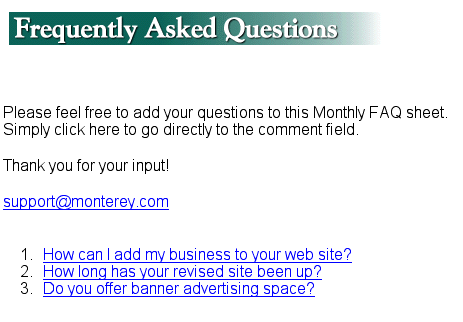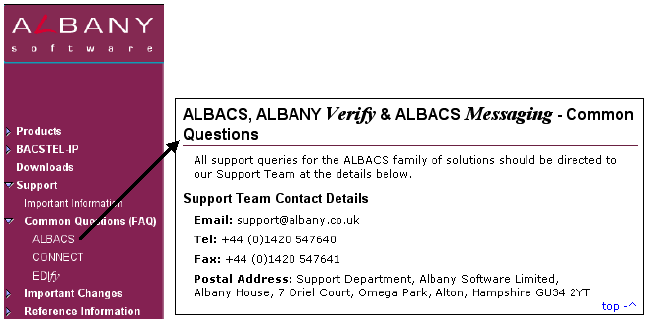Web Blooper of the Month
FAQ Doesn't Contain FAQs
One fairly common blooper is: the Frequently Asked Questions page contains questions that are clearly not frequently-asked, or no questions that are frequently-asked, or even no questions at all. Although I didn't consider this blooper common enough to include it in Web Bloopers, it is one of Nielsen's Top Ten Web Design Mistakes for 2002 (see UseIt.com). So it may be more common than I thought.
Monterey.com FAQ Page
Monterey.com, a website created by the Monterey (California) Chamber of Commerce to promote tourism, exhibits this blooper. The page has answers to only three questions, of which the first and third could be frequently-asked questions, but the second certainly is not.

Although the text at the top of the page invites visitors to submit questions and suggests that the questions are updated monthly, the page has contained these exact same three questions ever since the latest version of the site went online in early 2001. (At the time of this writing -- Dec 2003 -- that's almost three years.) So this seems to be a case of another blooper as well -- one that I did included in Web Bloopers: Out of Date Content. This lack of site-updates is another reason why the second question seems out-of-place on the FAQ page.
Albany.co.uk
Albany.co.uk, the website of a software company in the U.K., has FAQ pages for each product. Clicking on "Support" in the navigation hierarchy on the left of the home page expands the hierarchy to show various customer-support options, one of which is "Common Questions (FAQ)". Clicking on that expands the FAQ-item to list the company's products. Clicking on those is supposed to display FAQ pages for each product. Except that the "FAQ" pages for some of the products have no frequently-asked questions, but rather only a customer-support number.

As with Monterey.com, the FAQ page shown above has been like this since 2001, making it implausible that this is just a case of a new product for which no customers have asked any questions.
Avoiding the Blooper
FAQ pages should provide answers to genuine frequently-asked questions. FAQ pages should not contain answers to questions the site-owners would like to answer, or to questions that have easy answers. Telephone numbers and email addresses that customers can use to ask questions should be provided, but not as the main content of a FAQ page. Instead, customer-support contact information should be treated as an alternative to using a FAQ. A FAQ page might end with a mailto link to customer suppport, for example:
Can't find the answer to your support question? Ask customer support.
To paraphrase Sgt. Friday, one of the characters in an old police TV show: "The FAQs, ma'am, just the FAQs."